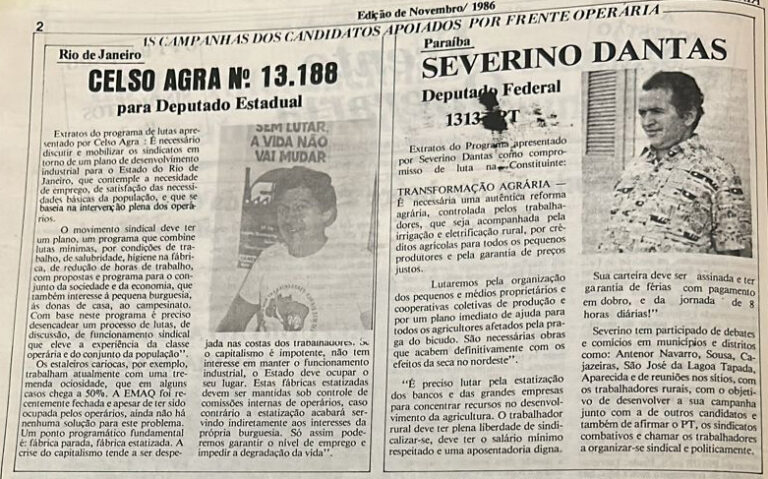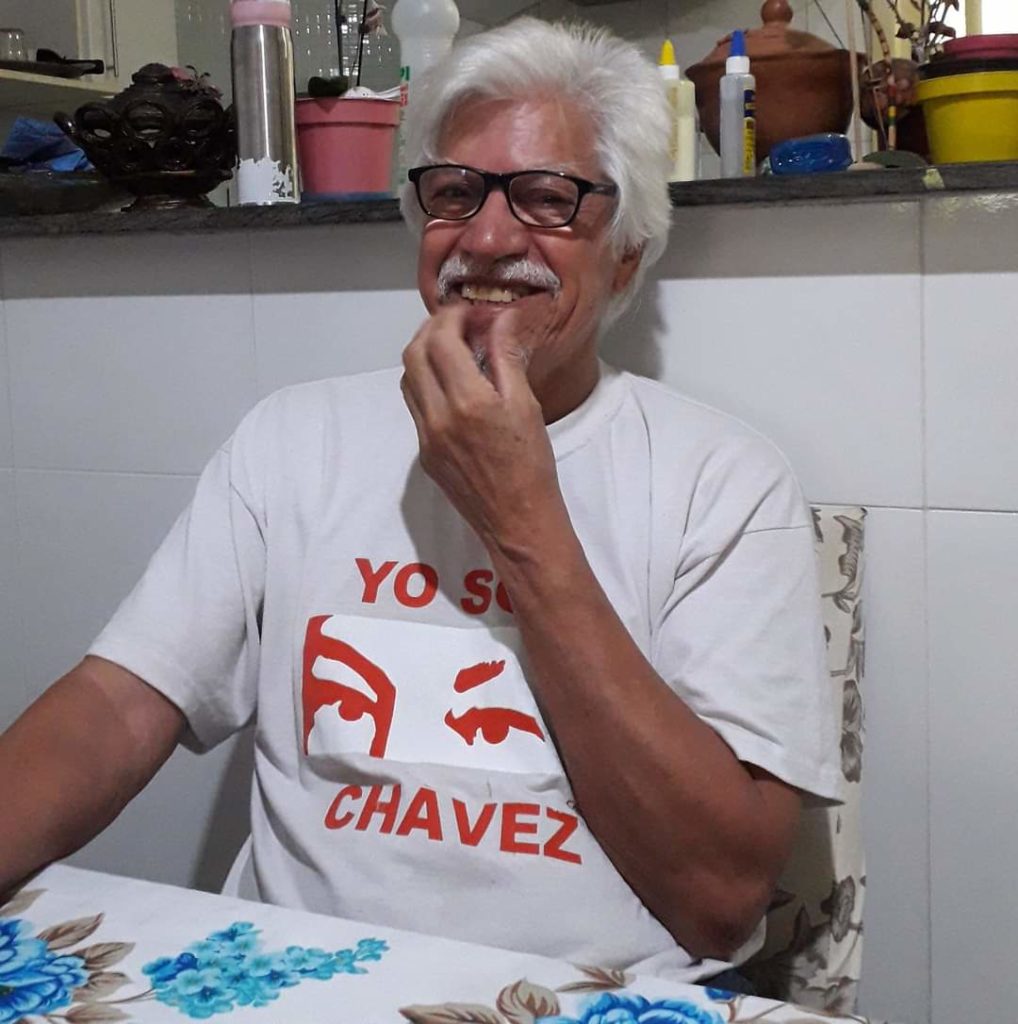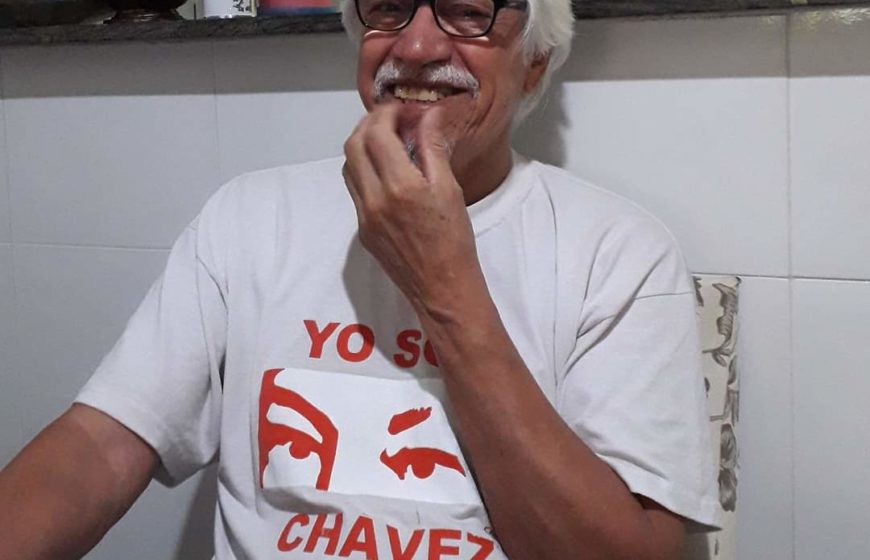Celso Agra took part in the construction of the CUT (Trade Union Centre), that of the PT São Paulo and Niterói, and that of the Cieps[2] in Rio de Janeiro. This was after a whole trajectory of struggles in support of Getúlio Vargas[3], of the Leonel Brizola’s Legality Campaign (1961)[4], and against the coup that overthrew João Goulart (1964)[5], [in the times when he was] intervening in the struggle at the Niterói shipyards[6].
Persecuted, tortured and kept prisoner when Rui Oswaldo Pfuzenheuter was murdered[7], he was detained for a long 2 years in the dungeons of the dictatorship in Brazil between 1972/1974; after he was granted political amnesty, he continued to fight for the socialist ideals. He became a candidate for State Deputy in Rio de Janeiro, together with his late companheiro Severino Dantas, as part of a team of candidates supported by the Posadist newspaper Frente Operária. The theme of his electoral campaign was: “Without fighting, life cannot change”.

Frente Operaria, November 1986 campaigning for the liberation of jailed comrades
Extracts from the program of Struggle presented by Celso Agra:
“For the State of Rio de Janeiro, it is necessary to discuss and mobilize the trade unions around an industrial development plan which addresses the need for employment and the satisfaction of the population’s basic needs based on the full intervention of the workers.
The trade union movement must have a plan, a program that combines minimum struggles for working conditions, health, hygiene in the factory and reduction of working hours, with proposals and a program for society and the economy as a whole, in the interests of the petty bourgeoisie too, the housewives, the peasantry. Based on this program, it is necessary to launch a process of struggles, discussion and trade union functioning that elevates the experience of the working class and the population as a whole.
The shipyards in Rio, for example, currently work with a tremendous inertness, reaching 50% in cases. The Emaq Shipyard was recently closed and despite being occupied by workers, there is still no solution to this problem. A basic point of programme must be: workplace stopped, workplace nationalized. The crisis of capitalism tends to be dumped on the backs of workers. Capitalism is powerless, it has no interest in maintaining industrial functioning; the State must take its place. The nationalized enterprises must be kept under the control of internal workers’ committees; if not, nationalization ends up serving indirectly the interests of the bourgeoisie. This is the way to guarantee the level of employment and prevent the degradation of life.”

Celso Agra was an exemplary disseminator of J. Posadas’ books and publications – participating in international bookfairs in Venezuela (FILVEN) and Cuba, supporting Hugo Chavez, the Bolivarian and the Cuban revolutions, spreading news and debates in favour of the role of China and Russia in the current revolutionary processes. He always tried to educate people on the street, the friends and relatives.
Here are some statements his family received from the São Paulo and the Belo Horizonte’s comrades:
– “A friend from the Associação dos Anistiados [8] says that Celso made history with his activism in the labour movement here, in ABC Paulista[9]. I’m remembering some of those moments of struggle. He always had a noble, supportive soul and was very dedicated to his goal of achieving a better and more humane world.”
– “Celso Agra, never gave up on his convictions. An internationalist above all. We were candidates for the PT together in 1986. Good times, the PT was still under construction. And even better, with Lula President again in his third term. Celso’s beard reminded me of Trotsky. We remember comrade Celso with great affection.”
At Celso’s funeral, companheiro Rogério, brother of Rui Oswaldo Pfuzenheuter, was present on behalf of everyone. With his violin, he played Beethoven’s Ode to Joy and the International (anthem of the Communist International) sung by the PT group which Celso had been a part of, in actions and in weekly public events at the Niterói ferry station. The procession played the anthem all the way to the grave.
Celso is present in the fight for socialism, his eternal flag!
PosadistasHoje
05/16/2024
* * * * * *
Tribute from the Popular Committee de luta of Araribóia (Niterói)
We are all shaken, dismayed by this sudden farewell to our friend Celso Agra. Historical activist of the Workers’ Party (PT), always consistent with his democratic, socialist and freedom ideas. At the age of 80, he attended all political demonstrations. He was our loyal and assiduous companion of the Popular Struggle Committee of Praça Araribóia, where he used to speak to the population, talk to the one and the other – teaching, denouncing the ghost of fascism, defending the Lula’s government.
He produced his pamphlets and distributed them on the streets and squares, doing the work of a true militant who never abandoned the streets and contact with the people. Always up to date with the national and international political news, he shared his economic analyses every week in our weekly meetings, helping us to move in the right direction in the struggles. He sold books with political content, and frequently offered them to one person or the another, always spreading socialism, condemning the genocide in Gaza and the wars promoted by NATO and US imperialism.
A person of Celso Agra’s moral and political stature will leave among us lessons of fraternity, courage and engagement in the political struggles to overcome capitalism and conquer socialism. It was encouraging to arrive at our Banquinha (stand) every Thursday and find Celso Agra there, white haired, smiling, jovial, ready for another day of militant work within the founding principles of our PT.
He will be missed by his family and by the militants of our Arariboia Popular Struggle Committee, speaking enthusiastically on the microphone about Lula’s actions, convincing the population to fight in defence of his government, with a critical but also realistic look at the correlation of forces being faced in Congress, and in deplorable Bolsonarism. In our struggles, Celso Agra will always be a beacon to us.
We embrace your family fraternally in this moment of pain and departure. Celso did not live in white clouds; his life was dedicated to his family, to his work as a metalworker, to trade union and PT activism, to the Brazilian people.
Celso Agra Present, today and always!
Niterói – 05/18/2024
NOTES
[1] The ABC is the third largest industrial centre in Brazil, with car manufacture and high-tech hubs.
[2] The Cieps are Integrated Centres of Public Education, founded in Rio de Janeiro in 1982 by the government of Leonel Brizola in a formidable response to the influx of rural migrants into the State of Sao Paulo. (Wikipedia)
[3] Getúlio Vargas (1882-1954) became president of Brazil twice: 1930-45 and 1951-1954. In 1923, he led troops during the civil war. In 1930, a left military uprising placed him in government, ending 40 years of oligarchic rule.
[4] Leonel Brizola (1922-2004), engineer by trade, launched into politics by Vargas in the 1930-50s. The Legality Campaign (Campanha da Legalidade) was a civil and military mobilisation in 1961 to ensure the inauguration of João Goulart as President.
[5] João Goulart (1918-1976), familarly called Jango. Became President 31 Jan 1961, overthrown by the military coup of Humberto Castelo Branco. This ended the Fourth Republic (1946-64) and installed the military dictatorship that was to last until 1985.
[6] Niterói is a municipality in the South East of the State of Rio de Janeiro.
[7] Rui Oswaldo Pfuzenheuter was murdered by the 1964 military junta. On 31 March 2024, hundreds of people in the city of São Paulo walked to a former government detention and torture centre in an event known as the ‘Walk of Silence’. The participants were there to remember the anniversary of the 1964 coup and the victims of the dictatorship, with many carrying large, black-and-white pictures of the victims. (Extract from Wikipedia).
[8] The Brazilian Association for the politically amnestied, ABAP.
[9] In the years 1978-1980, the ‘ABC Paulistas’ strikes were a series of workers protests that took place in the ABC region in a context of ‘re-democratisation’ to bring down the military dictatorship. The latter was only brought down in 1985. (Editorial)
















